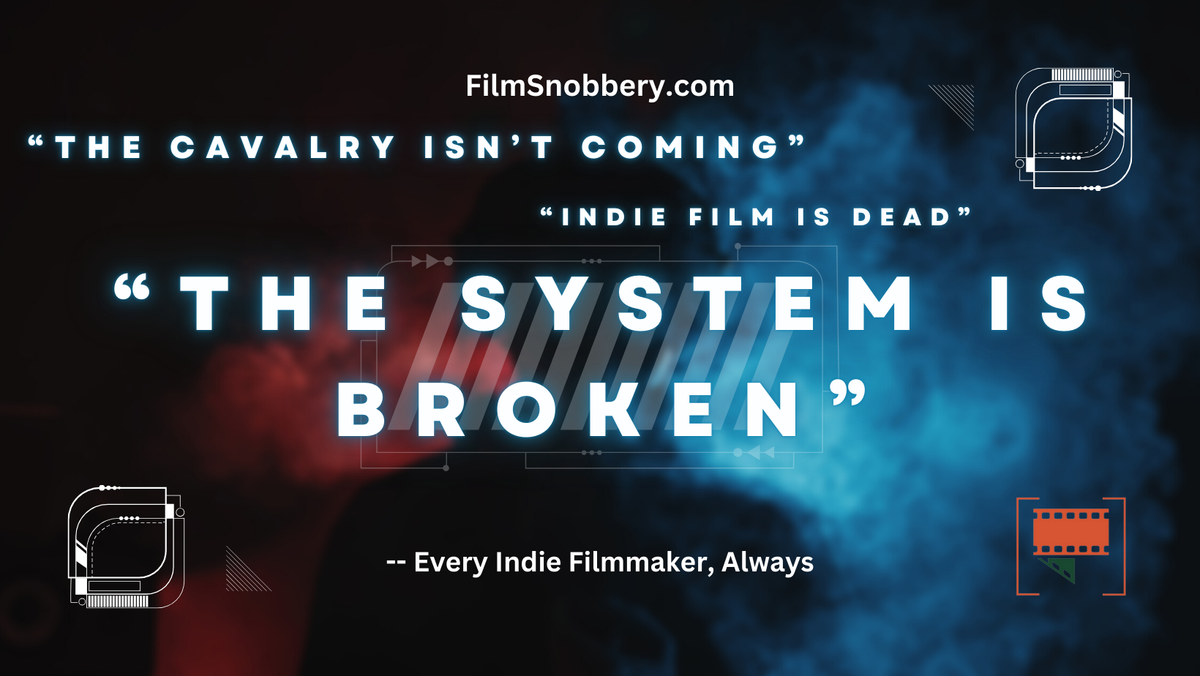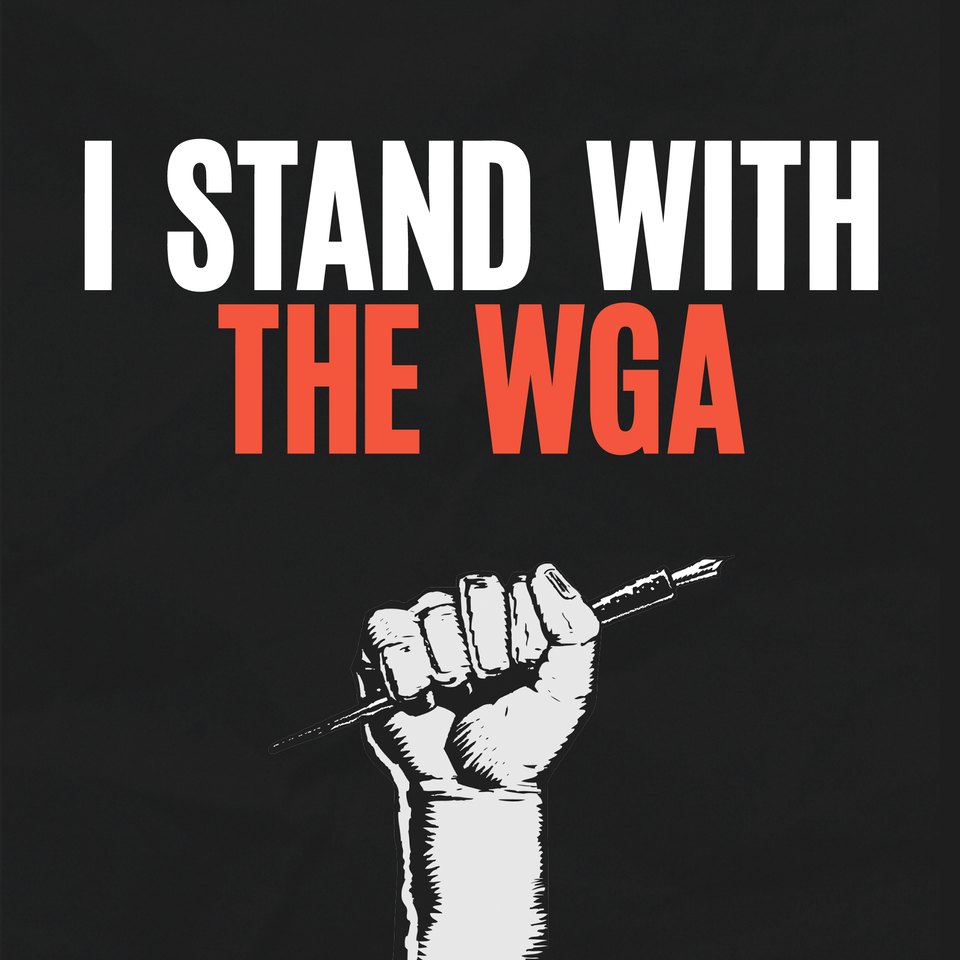Problems and Solutions

Quit Your Bitching.
Do I have your attention? Good. Keep reading.
Years ago, I was working as a network engineer, and I would often complain about everything. I was young, still learning, frustrated that I wasn’t progressing more in my career at a faster pace. I had a negative attitude. I was always the first person to point out the problems, but not quick on the button to suggest solutions. My boss put me right one day when my temperament was particular sour.
“Don’t complain unless you’re prepared to discuss a solution.”
I’ve been working exclusively with independent filmmakers for fifteen years. That’s a long time. In that time, I’ve heard every excuse in the book as to why someone failed to securing funding for a film, was unable to shoot something, didn’t get into the festival or contest they wanted to, or didn’t get the distribution deal they were hoping for.
These excuses weren’t exclusive to any one type of person or group. These complaints are universal through the indie film world.
Those lucky few who were able to scale the wall and make a living from being a filmmaker looked back to find the wall built higher and sturdier than before, cutting off that avenue for the next person trying to climb over.
Indie film is a walled garden of false scarcity run by a handful of companies that are constantly finding and closing loopholes to keep new blood out of the industry. Even those who are fortunate enough to have made it into this supposed Eden are faced with lackluster marketing budgets, pitiful advances, and criminal accounting practices that ensure the filmmaker never sees a dime from their hard-won battles.
We just went through roughly half a year of labor strikes via the WGA and SAG/AFTRA with studios at out stating that they’re willing to let people starve and lose their homes, and yet, as of this writing today, both parties are back to work for those same studios. It will be business as usual until it gets so incredibly bad and unsustainable again for creators that they’ll be forced to do it all over again.
How do we break this cycle?
I speak often with filmmakers at festivals, events, over the phone, Zoom meetings, and email. Most of them have different approaches to what ultimately works for them, but they still feel stunted in their growth from this invisible hand wrapped around their throats, suppressing their creative voices.
Some people don’t create out of laziness. Some out of fear. Others because they’re waiting for conditions to create to be juuuuust right (this is probably also an extension of fear). For every filmmaking that is trying to raise $50,000 for a movie, there are two more making them for $2,000 or less. Is it fair to compare the two filmmakers? Maybe. Circumstances are different for everyone. Maybe the filmmaker making something for $2,000 already owns their own equipment and has a crew working for nothing. Maybe the person trying to make a movie for $50,000 is using SAG actors to try to create a better package for future distribution.
No one film is the same. No one person’s situation is the same. By that logic there can’t be one catch-all solution, right?
Yes and no.
There is a reason that studios have the leverage over filmmakers and other creatives that they do.
Scale.
Think about Amazon. Not the streamer, but the online store. Are they really so dissimilar to a person having a garage sale on their front lawn? What is the major difference? Both are selling goods. Yes, one is a local market and the other is global, but that’s semantics for the purposes of this conversation. The real difference is scale. Amazon is playing with more money and more resources. They can reach a global market because they can flood said market with advertising, use listening tools to gather sentiment, use targeting (and re-targeting) methods to keep the shopper engaged and drawn back to products that they want or need. They utilize the marketing funnel to its fullest until, inevitably the customer converts and makes their purchase.
What is my point with this comparison?
The studios have the advantage of scale. They hold all the cards because they own the marketing apparatus that converts eyeballs into dollars. But even that level of scale can be bargained with (see the outcomes of the recent WGA and SAG/AFTRA strikes). While these bargains are really just band-aids, they do show just how vulnerable the studio system is to labor actions. They showed studios that the creator class is the producer of their products, and without them, they’d just be selling knickknacks on their front lawns.
It was incredibly frustrating to see two massive groups of creators, during the strikes, not realize that the real power they had was the ability to organize and create for themselves. There are reasons why this would have only marginally worked, but a movement like that would have echoed longer and further than winning a three-year contract negotiation. Walking away entire from a system that not only doesn’t value their participants, but openly mocks, ridicules, and scorns them would have sent a message to other industries that would have ripped through capitalism itself. But that didn’t happen, and that’s okay. Maybe now wasn’t the time. Maybe now people just needed to keep a room over their heads, and needed to keep their families fed. You can’t blame them for that. They didn’t do that to themselves, the system did that to them.
There’s a reason you didn’t see a sea of A-list stars flooding the streets with pithy picket signs and making it rain Benjamin’s like it was last night’s strip club outing in Vegas. (While arguably not an A-list celebrity, Drew Carey is the hero of the WGA strikes. If you don’t know why the author of Dirty Jokes and Beer is the GOAT, then look it up yourself.)
People reach a certain level of wealth and riches where they aren’t a part of the same society we are. I’m sure they were aware of what was going on, but it never impacted them on any real level, so they couldn’t be expected to put their backs into it. What they’re fighting for isn’t 2% gains, their contracts are wildly different than the average SAG/AFTRA actor. If those actors don’t work for a year, they’re not losing houses or sleeping in cars. They are not like us.
Get to the point, right? I’m getting there. This means something.
I just brought up a lot of problems, right? So now it’s time to hear some solutions.
The first one should be obvious. An independent filmmaker’s union. Now, I’ve heard this has been tried before, and there are some loose groups pretending at being unionized (and no offense at all meant to those groups, at least you’re trying to do something). People get hung up on nomenclature, and other things that don’t further the conversation. The real reason why the independent film industry doesn’t work is because there is no industry. It’s tribal. It’s the British Isles during the times of the mythical King Arthur and the studios are the Saxons (depending on which version of the Arthurian legend you want to derive from). There is certainly superficial unity. Filmmakers cheer each other on at festivals, pass the hat for each other’s crowdfunding campaigns, and repost and share their social media content. But what is the ultimate impact of a group of people passing the same $50 around? I’ll answer for you, not much. It’s good for morale, but it isn’t paying the rent.
Independent film, as an artform, needs to be treated like a business. There are lots of ways to do business, and there are a lot of benefits (tax-wise and in other ways) to doing business the way large corporations do. Yes, there is denitely an ‘ick’ factor to it. Business and creativity don’t want to mix naturally. They’re diametrically opposed. One feeds the pocket, and the other feeds the soul.
Independent film lacks foundation. This is also okay, and not anyone’s fault directly. Film as a medium is only roughly 120 years old. In the scope of human life on this planet, that’s less than a blink of an eye. That means nothing is set in stone yet, and we can write what that future looks like. We can create a foundation for film that works for the majority of independent filmmakers (there will always be outliers, and as technology progresses and storytelling methods evolve, these mechanisms will need to evolve along with them).
The foundation for indie film, at least for the moment, needs to be rooted in business. It needs collective bargaining tools to negotiate better contracts, better pricing for equipment and services. It needs to be able to go to local, state, and federal levels to lobby for the best interests of the group. This is what corporations do, and it seems to be working just dandy for them. Who should be in charge?
People who are tenacious. A few tough sonofabitches who won’t back down from a bad deal. A board that has enough clout to get things done and aren’t just there to get their names on a masthead. Leaders. Those leaders work in tandem with committees specifically tasked to further the agendas of various areas pertinent to indie filmmakers. You need fundraisers. I don’t mean Kickstarter experts; I mean grant writers and people who understand how to reach and sell true patrons of the arts into the indie film machine. You need to make indie filmmaking so undeniable a profession that parents won’t roll their eyes when you tell them you want to be a filmmaker. They won’t ask you what your back up plan is, because indie film is a secure and rooted institution.
Okay, but is it really indie film then?
No. Probably not. You’re now your own studio, working with other filmmakers and creatives to make, market, and distribute things. You’ve become what you fought.
Let’s not get stuck on the term “indie film”. I get it, you’re a rebel. You’re an edgelord who would never sell out. But is that because you don’t have anything to sell?
Indie film doesn’t have to be a death sentence.
There is no reason for anyone to martyr themselves on the altar of indie film. Independent film was always meant to be a steppingstone to a more fruitful career in the arts. It was supposed to be like your teen or college goth years. If you’re still in that phase and need to work through it more until you nd out what kind of artist you really are, then great. But if you’re ready to join the rest of us on planet reality, then you need to start looking at your art as an endpoint for commerce.
Collective bargaining, a union, a company, a foundational structure to build on. That’s one idea to make indie filmmakers ready for success.
Education is another means to making indie filmmakers successful. Having just interviewed several dozen filmmakers for my upcoming book on indie film marketing (due out in 2024), the one thing that stuck out is that most filmmakers were woefully unprepared for working in the film industry. From marketing, to understanding the legalities of the documents they were signing, etc. The main takeaway from many of those discussions was “this is someone else’s problem”. The studio does the marketing, so I don’t need to worry about that. My lawyers and reps went over the contracts so I’m sure they’re fine. Over and over again, the buck was passed (and this isn’t a knock on the folks I spoke to. Flat out, this is what they were told in film school, or when they entered the industry). Even folks who want to get involved were either told no, or were kept at arm’s length, and the art (and sometimes the artist) suffered for it.
Filmmakers who are waiting for a magic sack of money, and someone to lay a contract down on the table for infinite distribution of whatever their minds can generate isn’t going to happen. You are setting yourself up for failure and disappointment.
The truth is…This is a hard industry to be in. It’s almost impossible to break through the noise without an insane amount of work, some luck, and a unique take that people gravitate towards. Most people in this industry fail, even really talented people. It happens every day. Filmmaker’s need to pay their bills like any other vocation. So why do we treat filmmaking differently? We don’t treat filmmaking the same as a shift at the bodega, or selling cars, or hawking TVs at Best Buy. Why? Because we want to think we’re different than those people. We’re willing to go broke to prove to those people that our thoughts and dreams matter.
This is valid. Art is important. But art alone is not sustainable unless you own the gallery it’s displayed and sold in.
One of the smartest purchases I’ve seen filmmakers make recently is movie theaters. Kevin Smith and Quentin Tarantino have all but guaranteed that their legacy will live on for the foreseeable future. They will always have a way to show their lms, even if it’s just on one or two screens. They will always be able to program exciting lms and events to draw people in. They own the stage. They own the means of distribution at that point. Genius moves from both of them, but not exactly duplicatable for the rest of us.
Again, this is where treating indie film like a business comes in. Filmmakers use that collective bargaining power of the business entity to secure the loans necessary to buy a small chain of theaters, hire talented people to program the films and events, hire really, really good managers to run the business and keep the things afloat. Now you have a means of distribution. That same monetary power can be used to produce our own physical media and merchandise. Money doesn’t buy happiness; it buys time and options.
I’m not talking about building a hippie collective of rah rah cheerleaders. We need doers. We need people who eat, sleep, breathe, and screw independent lm. We need businesspeople to balance out the creatives. We need decision makers who can make those decisions not out of desperation, but out of sound business judgement based on market factors and audience reactions. We need to think outside of our own indie film bubble and look at what works in other industries and emulate or adapt those strategies to work for us.
This is…a lot.
Yeah, it is. If you’ve read this far, thank you. I understand it’s a rambling manifesto that you’ve probably groaned at several times. But am I wrong?
A smaller scale version of this would be an indie film community fund. A board of trustees and several fundraisers (again, grant writers and people who know people with deep pockets) would work with filmmakers, who would need to submit business and marketing plans for their films, and if they were approved, they would get dispersed money to finish, market, and distribute those films. They would be assigned a case worker to ensure those funds were spent properly, and invoices would be accounted for so everything would be on the up and up.
That’s a possibility. It’s treating filmmakers more like children than professional adults and de facto business owners themselves, but maybe that’s what’s needed. Sometimes dad doesn’t give you the keys to the family car unless he knows he can trust you first.
Okay, so what am I saying with all of this?
I’m ultimately saying that I acknowledge that the system is broken and it’s near impossible to make a living as an indie filmmaker in today’s world. Some of this is because you continue to play by the same arbitrary rules you think you absolutely have to follow. Make the movie, submit to festivals, get distribution, fail at everything, rinse, repeat. Until you go broke.
Is that really the smart way to do this? There are no rules, so think bigger. Think outside yourself of what independent film could be.
If you truly want there to be an indie film industry, and an indie film community (that does more than just complain about how broke and gatekept everything is), then you need to be part of the solution, instead of just pointing out the problems.
I want to hear your solutions. Let’s talk.




